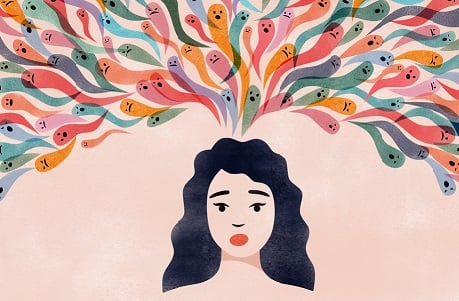Thoughts Are Just Thoughts: How to Stop Worshiping Your Anxious Mind
Thoughts Are Just Thoughts: How to Stop Worshiping Your Anxious Mind

View the ADAA Live Webinar with ADAA members Drs. Kissen and Greene - What Are Intrusive Thoughts and How Can You Deal with Them?
If you suffer from anxiety, you probably have a contentious and complicated relationship with your mind. It feels like your mind tortures you. It gives you all these thoughts about what you should be scared of and horrible things that could happen to you.
It tells you that you need to worry, analyze, and seek reassurance about all these things. It never shuts up. It won't leave you alone. Perhaps worst of all, when you try to tell it why you probably don't need to be afraid of all the things it says will happen, it calls you crazy or stupid or any number of bad names. It's a bully.
It feels like your mind is torturing you.
And yet…you worship your mind. You take what it says very seriously. You believe that if your mind says something, it must be important. It must mean something. No matter how mean your mind is to you, you give it the utmost respect and trust. That's the problem.
It is your torturer, and yet you worship it. In what other situation would you ever want to worship your own torturer?
The problem is not the fact that your mind gives you negative thoughts; the problem is that you take your mind so seriously. Just because your mind says something is important does not mean it actually is important. Just because something feels important also does not mean it is important.
Thoughts are just thoughts.
Thoughts are not facts. Thoughts are not meaningful. The content of your thoughts is not important.
What is important is how you treat your mind. If you take everything it says seriously, give it too much respect, and put too much trust in your mind, that is a recipe for an anxiety disorder.
There is a healthier way to approach your mind: don't take it so seriously. Don't believe everything it says. Don't treat your mind as a trustworthy source of information, especially about the things that make you anxious.
Don't get me wrong, you don't have a bad mind. It's not that your mind feeds you meaningless, negative thoughts and everyone else's mind is on target. This is how all minds work.
Your mind is just doing what minds do. Our minds like to warn us about stuff because our minds think they are keeping us safe by doing this. Your mind would always rather err on the side of giving you a warning than not because it is more likely to keep you physically safe that way, and your mind cares about that more than anything. But just because your mind is doing its job, that doesn't mean the thoughts actually mean anything. Again, thoughts are just thoughts.
When you have a thought that your relationship partner might leave you, that's just a fart noise in your head. Treat it as such: ignore it and move on with whatever you were actually doing with your day.
When you have a thought that you touched something dirty and you might catch a deadly disease, that's just a random neuron firing in your brain. It means nothing. Treat it as such: be dismissive toward your mind and don't give it any of your attention or time.
When you have a thought that your anxiety will never get better, that's just a buzzing sound in your head. Treat it as such: sarcastically say to your mind, "Good one, thanks for that, keep 'em coming!"
Remember, when you treat your mind this way, it doesn't mean your mind will necessarily stop saying things like this. Your mind is going to do what it wants to do; you don't have control over the thoughts that pop into your head. No one actually does. The important thing is not what thoughts you have, it's what you do when you have those thoughts.
So the next time your mind starts spinning about why you should feel anxious about something, try to react to it differently. Don't worship your mind, recognize that it is a false god unworthy of your trust, respect, time, or attention. Instead, get back to whatever you are doing right in front of you in the present moment and put your effort into that.
Even though you can't stop your mind from continuing to give you negative thoughts, that's okay, because thoughts are just thoughts.












